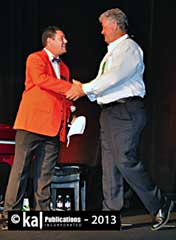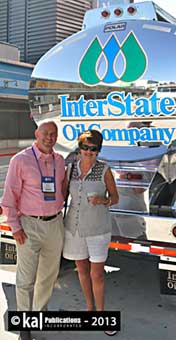
October 2013 Issue Highlights
For more complete coverage, send us an e-mail to
request a back
issue.

For more complete coverage, send us an e-mail to
request a back
issue.

Stantec and Friends Golf Tournament


Pacific Oil Conference


Western Carwash Association Convention
Want to see the photos that didn't make the issue? Check out the Cutting Room Floor.
Evergreen Oil
Files Chapter 11
Chevron Fined $422,500 For Fuel
Formulation Errors
Kinder Morgan to Pay $13 Million to
Clean Up Port Site
PEI Publishes Aviation Fueling
Guidelines
IRVINE, CA. — Evergreen Oil Inc., based here, has been acquired by Clean Harbors Inc., of Massachusetts for $60 million in cash.
Evergreen Oil, along with its parent company, Evergreen Environmental, had filed for Chapter 11 bankruptcy on April 9. The company listed both assets and liabilities between $50 million and $100 million at the time of filing. The company was acquired by Clean Harbors out of the U.S. Bankruptcy Court for the Central District of California.
Evergreen Oil collects waste oils and re-refines them into base oils at their facility in Newark, CA. It is one of the largest collectors of waste oil in California and the only re-refinery located in the state.
Although Evergreen had received praise for its waste oil recycling practices and mission — its re-refinery was a frequent stop for political candidates looking for a photo op in an environmentally friendly business — in recent months it had come under attack from Northern California environmental groups who did not want the toxic substances found at the refinery to be in their area. Local news reports from "anonymous sources inside the Department of Toxic Substances Control" said that the business continued to operate "despite continuous violations" of public health standards.
Evergreen officials said they filed Chapter 11 for several reasons, most notably a four-alarm fire in March 2011 that severely damaged some of its refinery equipment.
"Our acquisition of Evergreen aligns well with our Safety-Kleen re-refinery and environmental businesses, and creates multiple opportunities for profitable growth," said Alan McKim, chairman and CEO of Clean Harbors in an official statement. "California is an attractive market for us, and Evergreen has a strong presence in the state. Given the financial incentives available in California and that used oil is designated as hazardous, the addition of Evergreen will contribute to Safety-Kleen's ongoing initiative to lower its pay-for-oil (PFO) costs."
"We believe that we are purchasing this asset at a favorable price for our shareholders," McKim said. "While we plan to invest some capital into the re-refinery to enhance its layout and productivity, the plant is relatively new, with major portions of it having been rebuilt following a fire at the facility in 2011. In addition to the re-refinery, the purchase includes rolling stock and equipment, a diverse roster of West Coast customer accounts, an ancillary hazardous waste business and a TSDF in Carson, California - a state where stringent permitting requirements create barriers to entry."
McKim added, "We look forward to welcoming Evergreen's employees into the Clean Harbors and Safety-Kleen family."
SACRAMENTO, CA. — Chevron U.S.A. Inc. has been fined $422,500 in penalties for selling fuel that did not meet California state formulation requirements.
Chevron agreed to pay the penalties as part of three separate settlements it reached with the California Air Resources Board. In two of the cases, Chevron disclosed the violations. In the third, ARB enforcement staff discovered the violation as a result of routine fuel sampling.
In the first case, Chevron supplied 385,000 gallons of gasoline from the Chevron terminals in Sacramento and San Jose between mid-June 2009 and Aug. 1, 2009 without adequate amounts of ethanol.
In the second case, Chevron sold more than 36,000 gallons of diesel fuel in August 2009 that did not meet a required minimum cetane number set by California regulations.
In the third case, Chevron paid $192,500 for supplying more than 15.5 million gallons of gasoline with olefin levels that exceeded specifications. Chevron was notified by ARB of the violation and the agency noted that the oil company "took immediate steps to find and rectify the cause to prevent future occurrences."
SAN PEDRO, CA. — Kinder Morgan Liquids Terminals LLC has agreed to pay more than $13 million to clean up the former site of an oil terminal at the Port of Los Angeles.
The terminal was built in the 1920s at Berths 171-173 in the Port of Los Angeles. Chicago company GATX Corp. operated the Los Angeles Marine Terminal and shut it down in 1999. As part of an acquisition deal with GATX, Kinder Morgan became owner of the terminal in 2000 but never operated it and the facility was demolished in 2003. Pollution in the area was discovered long after the demolition was completed, leading to a lawsuit from the Los Angeles City Attorney's Office in 2005.
Los Angeles City Attorney Carmen Trutanich estimated that the total cost of remediation at the facility is going to be $22 million.
As part of the settlement, Kinder Morgan agreed to pay 60% of the remediation costs at the former terminal site. Texaco and ConocoPhillips had previously agreed to pay the remaining 40%.
As part of the settlement, the Kinder Morgan was given a five-year extension of its lease to operate another terminal in the Port of Los Angeles, at Berths 118-119, which authorities say will also require remediation.
TULSA, OK. — The Petroleum Equipment Institute has published a new document entitled Recommended Practices for the Design, Installation, Service, Repair and Maintenance of Aviation Fueling Systems (PEI/RP1300). It provides guidelines for the proper design, construction and safe operation of fueling systems.
The document was written in response to requests from aviation fueling facility operators, equipment manufacturers, and service and repair contractors to provide a single authoritative source of information for the design, installation, service, repair and maintenance of aviation fueling systems. The PEI says that following the guidelines, aviation fueling facilities can "minimize the possibility of fueling system failure, avoid practices that will unnecessarily increase installation costs, and minimize environmental impacts and hazards."
The document was authored by the PEI Aviation Fueling Committee under the leadership of Chairman Jim O'Day, O'Day Equipment. Other participants included Robert A. Becker, Becker Aviation Specialists; Michael J. Brunmeier, Petro-Chemical Systems, Inc.; Mark W. Cowie, White Tucker Company; Penelope Ellis, FuelMaster Syn-Tech Systems; Gordon Johnson, Millennium Systems International; John B. Lindner, Epic Aviation, LLC; Ron McDowell, PECOFacet; Scott Milsted, Mascott Equipment Company Inc.; Steve Thickstun, Advanced Fuel Systems Inc.; and Brian Wiegert, Rounds & Associates. Don Gilson of Gilson Environmental LLC served as committee consultant.
The single-copy price of the Aviation Fueling Systems Recommended Practices is $40 for PEI members or $95 for nonmembers. For more information or to purchase a copy, visit www.pei.org/RP1300.
Originally published in the October 2013 issue of O&A
Marketing
News.
Copyright 2013 by KAL Publications Inc.
Serving the 13 Western States, the World's Largest Gasoline, Oil, Fuel, TBA and Automotive Service Market